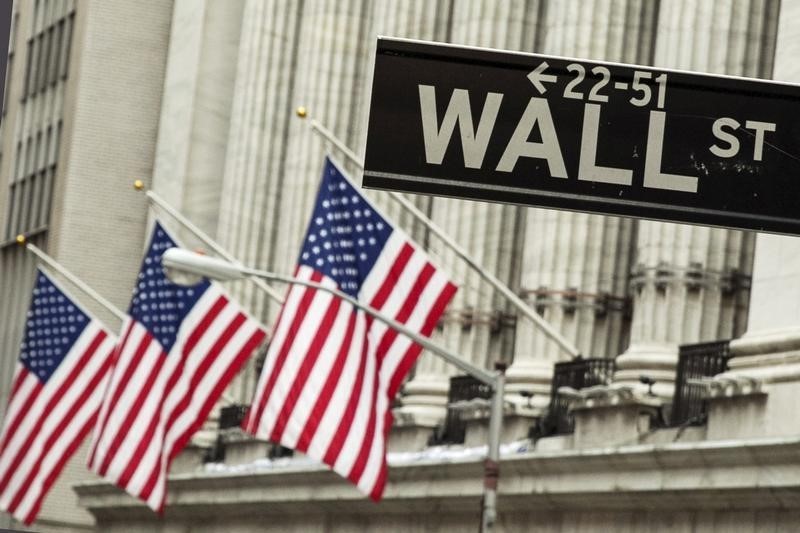Investing.com-- The S&P 500 snapped its eight-day wining streak, pressured by a fall energy stocks and cautious trading ahead of this week's Jackson Hole Symposium that will likely offer clues on monetary policy.
At 16:00 ET (21:00 GMT), Dow Jones Industrial Average fell 61 points, or 0.2%, while the S&P 500 fell 0.2% and NASDAQ Composite slipped 0.4%.
Energy stocks fall after oil prices give up gains
Energy stocks fell after oil prices gave up gains despite fresh uncertainty on a ceasefire deal in Gaza after Hamas said the current agreement was amended from the one on July. 2 that deemed was acceptable
The group also refuted U.S. Secretary of State Antony Blinken's comments that it had backed away from the deal.
The remarks from Hamas arrived on the heels of Blinken announcing that Israeli Prime Minister Benjamin Netanyahu had accepted a "bridging proposal" presented by Washington to tackle disagreements blocking a ceasefire deal in Gaza.
Valero Energy Corporation (NYSE:VLO), APA Corporation (NASDAQ:APA), Marathon Petroleum Corp (NYSE:MPC) were among the biggest decliners in the energy sector.
Jackson Hole awaited for rate cut cues
The Jackson Hole Symposium - a meeting of major central bank leaders and finance ministers - begins later this week, with an address from Federal Reserve Chair Jerome Powell on Friday.
Powell’s address will be closely watched amid growing conviction that the central bank is preparing to cut interest rates by 25 basis points in September, as recent economic readings showed some cooling in inflation.
Powell could potentially flag the possibility of a 50 bps cut, Evercore analysts said, although they do not expect the Fed chairman to explicitly mention just by how much the Fed plans to begin trimming rates.
"While there are good arguments on both sides for starting with 25bp cuts versus going with 50bps the recent rebound in risk sentiment would, all else equal, argue against more aggressive action," Deutsche Bank (ETR:DBKGn) said in a recent note.
DNC in focus as 2024 presidential race heats up
Focus this week is also on the Democratic National Convention, with President Joe Biden set to speak at the event later on Monday.
Vice President Kamala Harris was officially nominated as the party’s presidential candidate earlier in August, and picked Minnesota governor Tim Walz as her running mate.
Harris was endorsed by Biden in July, and was seen swiftly catching up with Republican frontrunner Donald Trump in recent polls, presenting a tight 2024 presidential race.
"Right now, we would deem the US presidential election too close to call with any degree of confidence, especially in view of the difficulty that Trump has had in gaining traction with the media in recent weeks, as it shifted its focus to Harris and its campaign," Macquarie said in a Tuesday note.
Robert F. Kennedy Jr. mulls ditching campaign to team up with Trump
Robert F. Kennedy Jr. is weighing up ditching his race for the White House and may instead be considering joining forced for the Republican presidential candidate, Donald Trump, Kennedy’s running mate Nicole Shanahan said in an interview.
RFJ Jr. may also choose to stay in the race, however, and seek to win more than 5% of the popular vote to become a third-party alternative to the GOP and Democratic parties .
Lowe's cuts annual forecasts, Palo Alto rallies on earnings delight, Eli Lilly weight loss drug shines
Lowe’s (NYSE:LOW) stock fell 1% after the home improvement retailer cut its annual profit and sales forecasts, pointing to a slim chance of a recovery in home improvement demand in the second half of the year.
Cybersecurity company Palo Alto Networks (NASDAQ:PANW) stock rose over 7% after posting top and bottom line beats for the fiscal fourth quarter.
The company's positive outlook on free cash flow, guiding for 37-38% margin for fiscal 2025 is likely helping its shares, "despite a growth outlook that looks materially lower than what the company laid out a year ago," UBS said.
Eli Lilly and Company (NYSE:LLY) rose 3% hitting a 52-week high after a late-stage study of its drug tirzepatide showed that the weight loss treatment cut the risk of obese adults developing Type 2 diabetes by 94%.
(Peter Nurse, Ambar Warrick contributed to this article.)
